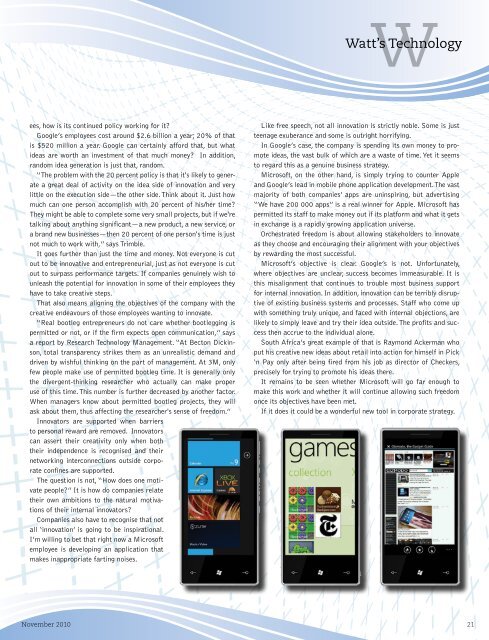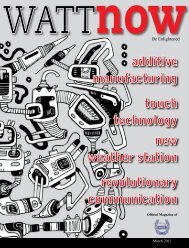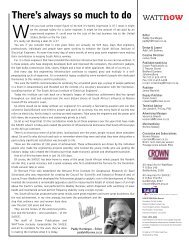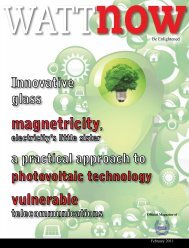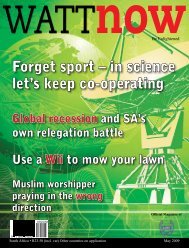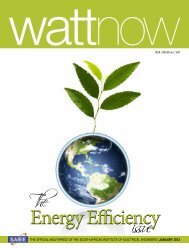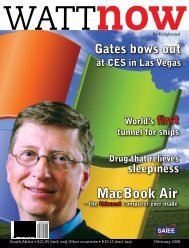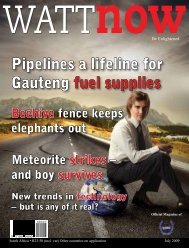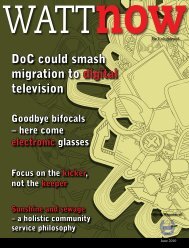download a PDF of the full November 2010 issue - Wattnow
download a PDF of the full November 2010 issue - Wattnow
download a PDF of the full November 2010 issue - Wattnow
Create successful ePaper yourself
Turn your PDF publications into a flip-book with our unique Google optimized e-Paper software.
W<br />
Watt’s Technology<br />
ees, how is its continued policy working for it<br />
Google’s employees cost around $2.6 billion a year; 20% <strong>of</strong> that<br />
is $520 million a year. Google can certainly afford that, but what<br />
ideas are worth an investment <strong>of</strong> that much money In addition,<br />
random idea generation is just that, random.<br />
“The problem with <strong>the</strong> 20 percent policy is that it's likely to generate<br />
a great deal <strong>of</strong> activity on <strong>the</strong> idea side <strong>of</strong> innovation and very<br />
little on <strong>the</strong> execution side—<strong>the</strong> o<strong>the</strong>r side. Think about it. Just how<br />
much can one person accomplish with 20 percent <strong>of</strong> his/her time<br />
They might be able to complete some very small projects, but if we're<br />
talking about anything significant—a new product, a new service, or<br />
a brand new businesses—<strong>the</strong>n 20 percent <strong>of</strong> one person's time is just<br />
not much to work with,” says Trimble.<br />
It goes fur<strong>the</strong>r than just <strong>the</strong> time and money. Not everyone is cut<br />
out to be innovative and entrepreneurial, just as not everyone is cut<br />
out to surpass performance targets. If companies genuinely wish to<br />
unleash <strong>the</strong> potential for innovation in some <strong>of</strong> <strong>the</strong>ir employees <strong>the</strong>y<br />
have to take creative steps.<br />
That also means aligning <strong>the</strong> objectives <strong>of</strong> <strong>the</strong> company with <strong>the</strong><br />
creative endeavours <strong>of</strong> those employees wanting to innovate.<br />
“Real bootleg entrepreneurs do not care whe<strong>the</strong>r bootlegging is<br />
permitted or not, or if <strong>the</strong> firm expects open communication,” says<br />
a report by Research Technology Management. “At Becton Dickinson,<br />
total transparency strikes <strong>the</strong>m as an unrealistic demand and<br />
driven by wishful thinking on <strong>the</strong> part <strong>of</strong> management. At 3M, only<br />
few people make use <strong>of</strong> permitted bootleg time. It is generally only<br />
<strong>the</strong> divergent-thinking researcher who actually can make proper<br />
use <strong>of</strong> this time. This number is fur<strong>the</strong>r decreased by ano<strong>the</strong>r factor.<br />
When managers know about permitted bootleg projects, <strong>the</strong>y will<br />
ask about <strong>the</strong>m, thus affecting <strong>the</strong> researcher's sense <strong>of</strong> freedom.”<br />
Innovators are supported when barriers<br />
to personal reward are removed. Innovators<br />
can assert <strong>the</strong>ir creativity only when both<br />
<strong>the</strong>ir independence is recognised and <strong>the</strong>ir<br />
networking interconnections outside corporate<br />
confines are supported.<br />
The question is not, “How does one motivate<br />
people” It is how do companies relate<br />
<strong>the</strong>ir own ambitions to <strong>the</strong> natural motivations<br />
<strong>of</strong> <strong>the</strong>ir internal innovators<br />
Companies also have to recognise that not<br />
all ‘innovation’ is going to be inspirational.<br />
I’m willing to bet that right now a Micros<strong>of</strong>t<br />
employee is developing an application that<br />
makes inappropriate farting noises.<br />
Like free speech, not all innovation is strictly noble. Some is just<br />
teenage exuberance and some is outright horrifying.<br />
In Google’s case, <strong>the</strong> company is spending its own money to promote<br />
ideas, <strong>the</strong> vast bulk <strong>of</strong> which are a waste <strong>of</strong> time. Yet it seems<br />
to regard this as a genuine business strategy.<br />
Micros<strong>of</strong>t, on <strong>the</strong> o<strong>the</strong>r hand, is simply trying to counter Apple<br />
and Google’s lead in mobile phone application development. The vast<br />
majority <strong>of</strong> both companies’ apps are uninspiring, but advertising<br />
“We have 200 000 apps” is a real winner for Apple. Micros<strong>of</strong>t has<br />
permitted its staff to make money out if its platform and what it gets<br />
in exchange is a rapidly growing application universe.<br />
Orchestrated freedom is about allowing stakeholders to innovate<br />
as <strong>the</strong>y choose and encouraging <strong>the</strong>ir alignment with your objectives<br />
by rewarding <strong>the</strong> most successful.<br />
Micros<strong>of</strong>t’s objective is clear. Google’s is not. Unfortunately,<br />
where objectives are unclear, success becomes immeasurable. It is<br />
this misalignment that continues to trouble most business support<br />
for internal innovation. In addition, innovation can be terribly disruptive<br />
<strong>of</strong> existing business systems and processes. Staff who come up<br />
with something truly unique, and faced with internal objections, are<br />
likely to simply leave and try <strong>the</strong>ir idea outside. The pr<strong>of</strong>its and success<br />
<strong>the</strong>n accrue to <strong>the</strong> individual alone.<br />
South Africa’s great example <strong>of</strong> that is Raymond Ackerman who<br />
put his creative new ideas about retail into action for himself in Pick<br />
‘n Pay only after being fired from his job as director <strong>of</strong> Checkers,<br />
precisely for trying to promote his ideas <strong>the</strong>re.<br />
It remains to be seen whe<strong>the</strong>r Micros<strong>of</strong>t will go far enough to<br />
make this work and whe<strong>the</strong>r it will continue allowing such freedom<br />
once its objectives have been met.<br />
If it does it could be a wonderful new tool in corporate strategy.<br />
<strong>November</strong> <strong>2010</strong> 21


